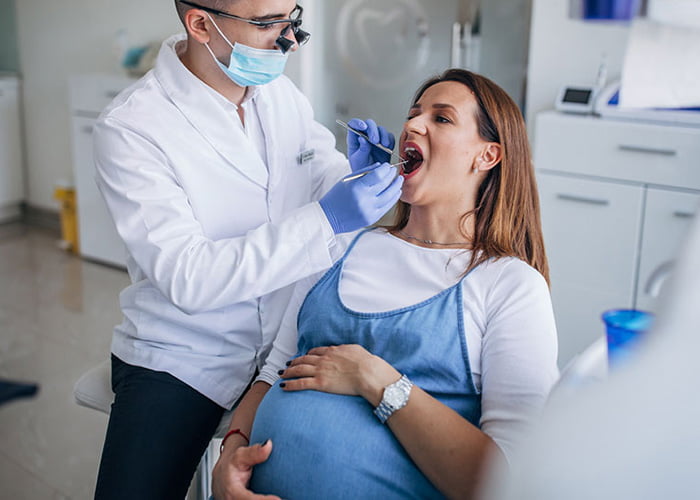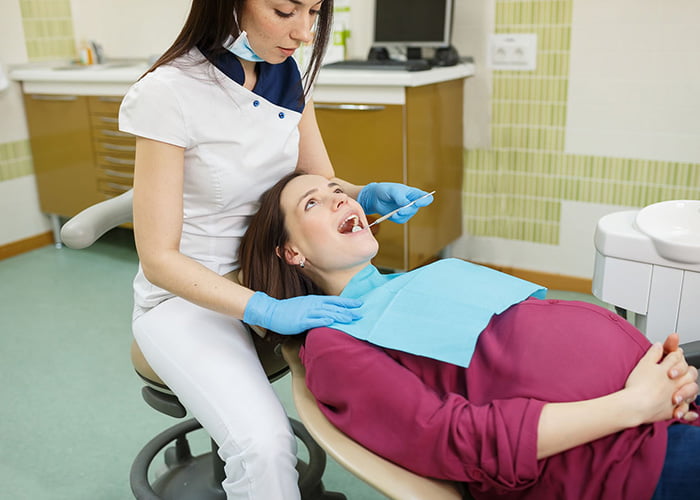Pregnancy is an exciting and hectic time, and there is often a lot to think about! One potential problem area could be your teeth — especially if dental treatment is required. Risks and consequences may apply to any treatment. Always seek a second opinion when considering complex treatments. In some cases, referral to a specialist doctor may be necessary.
Let’s take a look at some common pregnancy-related dental issues, and whether you can safely have dental treatment & dental fillings during pregnancy.
Can I Go to the Dentist While Pregnant?
While we advocate delaying elective dental practices until after the baby is born, it is safe to have a dental exam and correct oral problems before birth. Please inform your obstetrician for advice on dental exams. To ensure a safe pregnancy, notify your dentist.
Tell your dentist about all your prescriptions, including prenatal vitamins, medications recommended by your primary care physician, and any specific medical care you may receive. Okay. This new knowledge may require your dentist to change your oral care strategy.
Pregnancy should not prevent visits to the dentist. Pregnancy hormones increase the risk of dental disease. Therefore, keep an eye on your oral changes at this time. If you experience bleeding, swelling, or sore gums during pregnancy, see your dentist or periodontist right away.
Don’t visit your dentist because you’re pregnant for a check-up. This is the stage where professional tooth cleaning is crucial.
What Are the Common Dental Problems During Pregnancy?
Dental work while pregnant first trimester is a wise choice. Because during this period, morning sickness and fatigue can cause you to neglect dental care, visiting the dentist is essential for healthy teeth and gums. Preventing pregnancy-related dental problems that start before conception. This reduces dental worries and allows you to focus on your pregnancy. You need to go to the dentist, scrape, and polish.
Tooth Decay
Pregnancy symptoms can cause tooth decay. Morning sickness and fatigue in the first trimester can cause you to neglect dental care, increasing your risk of tooth decay.
Cravings during pregnancy can also increase sugar intake, increasing the risk of disease. To prevent tooth decay, you must brush your teeth after meals, floss daily, and use fluoride mouthwash. In severe cases, you can completely accept the advice of performing temporary tooth filling during pregnancy to improve oral health.
Tooth Wear
Vomiting can cause tooth damage.
Pregnancy hormones soften the muscle ring that keeps food in the stomach. Strong stomach acids can coat your teeth due to gastric reflux (regurgitating food or drink) or morning sickness vomiting. Reflux and vomiting on a regular basis can damage the surface of the tooth (the enamel) and increase the risk of decay.
If you are vomiting, try the following remedies:
- Brushing your teeth immediately after vomiting is not advised. Brushing may scratch the tooth enamel while the teeth are coated in stomach acids.
- Rinse your mouth with plain tap water thoroughly.
- After that, use a fluoride-containing mouthwash.
- If you don’t have fluoridated mouthwash, smear a blob of fluoridated toothpaste on your finger and smear it over your teeth. Thoroughly rinse with water.
- Brush your teeth an hour after vomiting.
Read more: How to stop bleeding after tooth extraction
Gingivitis
Gum disease is another fairly common disease. Therefore, maintaining regular dental checkups is more important than ever. There is a 40% chance that a pregnant woman will develop gingivitis at some point during her pregnancy. If you already have severe gum disease, pregnancy can make it worse. If you experience pregnancy discomforts, such as bleeding, swelling, or sore gums, you should schedule an appointment with your dentist or periodontist as soon as possible.
Gum (Periodontal) Disease
During pregnancy, estrogen and progesterone levels increase, increasing the likelihood of gingivitis and periodontitis. Periodontitis results in the gums turning red and inflamed. They tend to bleed easily when brushed. This usually happens during the second and ninth months of pregnancy. Periodontitis is the destruction of the bone that supports your teeth. This leads to your teeth becoming weaker and more prone to falling out. This disorder has the potential to lead to tooth loss if left untreated. In some studies, periodontitis has been linked to giving birth too early, so prevention is important.

Can Pregnant Mothers Get Fillings? What About Anesthesia and X-Rays?
Pregnant women can have fillings as long as they are mercury-free. Due to the potential harm of mercury exposure, especially to the unborn baby, professional health authorities advise pregnant women to use mercury-free fillings. A woman’s second trimester is the best time for a filling or any other dental procedure.
During dental surgery, both local and general anesthesia ensure the safety of both mother and baby. This may be required during procedures like fillings, root canals, and extractions. Dental X-rays are not harmful to a pregnant woman. X-rays are safe, especially when the pregnant woman is wearing a lead apron during the scan.
What Type of Dental Work Should Be Avoided During Pregnancy?
Are all dental work while pregnant first trimester safe? Should pay attention or avoid dental work while pregnant first trimester? Here is some information we want you to know.
Although dental care during pregnancy is safe and advisable, doctors recommend against performing cosmetic or non-urgent dental services during this time. Services such as porcelain veneers, braces, etc. are not recommended during pregnancy. Dental work while pregnant first trimester such as cleanings, temporary fillings, and some other urgent procedures are given higher priority than routine procedures. Doctors also recommend limiting X-ray activities during this time if not absolutely necessary.
Read more: Types Of Dental Filling Costs
How Do I Maintain a Healthy Mouth While Pregnant?
Good Oral Hygiene
Oral hygiene techniques such as brushing at least twice a day, flossing once a day, and using an antibacterial mouthwash are all effective ways to prevent and reduce the severity of these problems. dental health problems. Don’t let the fact that you’re pregnant stop you from having a professional clean your home if you’ve been planning on doing so. Professional teeth cleaning is more important than ever. A dental professional may be needed if gum disease does not improve after treatment. Antibiotics and surgical removal of the affected tissue are two potential treatment options.
Diet
Sugar usually sticks to your teeth when you eat it. Microscopic bacteria enter your mouth to consume sugar and excrete acids. This is how sugar corrodes your teeth.
It is not advisable to completely avoid carbohydrate foods while pregnant. However, make sure to consume these foods in the correct amounts. These foods are available in the form of whole grains, fruits, and other healthy carbohydrates.
Cravings can make this difficult, but they can be overcome with alternatives. If you must consume sweets or carbohydrates, immediately rinse your mouth or brush your teeth. Remember that milk contains lactose, so proceed with caution after drinking milk.
Regular Dental Check-Ups
There are some pregnant women who don’t visit the dentist regularly out of concern that it could harm their unborn baby. In fact, this is the wrong solution. Significant hormonal changes are a common side effect of pregnancy, and they have been linked to gingivitis and tooth damage. Oral infections can have an indirect effect on the baby and often increase the chances of the pregnancy being terminated early or the baby being born prematurely.
See your dentist before you get pregnant for the best oral health possible. You won’t have to deal with any dental problems early in your pregnancy. If you have important dental work to be done, your dentist can do it before you get pregnant and you won’t have to worry about its effects on your unborn baby. This is another benefit of doing this.
It is important to visit your dentist regularly to have your teeth cleaned while you are pregnant. Your oral health will not be a contributing factor to the development of other health problems if you follow these steps.



